- Home
- Jerry Spinelli
Crash Page 2
Crash Read online
Page 2
I took a deep breath. I got up in his face. I stared. I dared him to blink first. I wanted to hate him, I wanted to stay mad, but I was having problems.
“Okay,” I said. I backed off. “Okay, I’ll give you one more chance to get me to dinner. If you beat me in wrestling. Are Quakers allowed to wrestle?”
He sniffed, he licked his lips, he pinched a drop of water from the end of his nose, he smiled. “Sure!”
We went to the grass. We wrestled. I pinned him in about two seconds.
“Okay,” I said, “one last chance. Hit the telephone pole. Ten stones.”
I hit the pole with six stones. He never came close.
We long-jumped. We stood on our heads. We spit for distance.
He was hopeless.
I shook my head. “Aren’t you good at anything?”
He didn’t think long. “I’m a good runner.”
I grinned to myself. “Okay,” I said, “one really, really last chance. A race.” I pointed. “Up to the mailbox and back to”— I ran my sneaker toe along the edge of the driveway—“here.”
We crouched, toes on the crack. I called: “Ready! … Set! … Go!”
I was six years old and had never lost a race in my life. That’s why I was so surprised when I reached out to push off the cool blue metal of the mailbox to see his hand there, too. On the way back I kicked in the afterburners and zipped across the finish line. His footsteps were loud behind me.
We stood there bent over, catching our breaths. I heard him say, “Dam!” He stamped his foot. First time I ever saw him mad.
“Don’t take it so hard,” I told him. “Nobody beats me.”
“That’s not it,” he said. He had on the glum monkey face again.
“So what is it?”
He sniffed. “Now you’re not coming.” He headed off down the street.
I let him get five or six houses away before I called, “Yo, Webb!”
He turned, sagging.
“I changed my mind. I’ll come.”
It took a minute to sink in. Then he jumped like a jack-in-the-box. He yelled, “Yahoo!” and ran on home.
That night, even after I closed my eyes, I kept seeing our hands hit the mailbox together.
5
My mother didn’t like the peel job on the tree, so I was grounded for three days. My sister collected the scraps of bark and got some Elmer’s glue and pasted them back onto the tree trunk like a jigsaw puzzle.
When I knocked on the door of the garage-house, I could hear him squealing “He’s here!” and running. The door flew open. He looked at me like he hadn’t seen me in years. “Hi, John! Come on in.”
“It’s Crash,” I told him.
He didn’t answer, just closed the door behind me. The white-haired man and a lady showed up. The kid stood between us. He straightened up, put on this serious, grown-up face, and said, “John, I would like you to meet my mother and father, Mr. Raymond A. Webb and Mrs. Glenda W. Webb. Mother, Father, this is my best friend, John Patrick Coogan.”
They got all smiley and stuck out their hands to shake and said like a duet: “Nice to meet you, John.”
“Call me Crash,” I said.
The mother just stood there grinning. The father nodded. “Crash it is.”
“I crashed into my cousin with my football helmet and knocked her all the way out into the snow.”
He nodded some more, he whistled. “I see.”
The mother spoke up. “Penn, why don’t you take John— uh, Crash—to your room for a few minutes till dinner is ready.”
Every other house I ever saw, you had to go upstairs to a bedroom. Here you just went a couple of steps from the front room and bam, you were there.
“Didn’t you ever live in a two-story house?” I asked him.
He thought. “In North Dakota we lived on the second floor of a house, but somebody else lived on the first floor.”
I shook my head. “Weird.”
His room was weird, too. “Where’s your toys?” I said.
He dove under his bed and pulled something out. “Here!”
“What is it?”
“A Conestoga wagon. It’s just like the one my great-great-great-grandfather Webb went out to North Dakota in. My great-grandfather made it for me. He said there’s a place in North Dakota where you can still see the ruts in the ground from all the wagon trains.”
It was wood, not even painted, old-looking, about ready for the junk heap. He pulled it across the floor.
“It wobbles,” I said.
He just kept grinning at it, like it was going to stand up on its bind wheels and bark.
I had been thinking about how some kids call their grandfathers “Pop-Pop.” “So,” I said, “what do you call him? Pop-Pop-Pop?”
I was too busy laughing at myself to hear his answer. I looked around. “So where’s the rest?”
Now he was pulling the wagon in circles. “The rest of what?”
“Your toys.”
He pointed to the wagon. “There it is.”
“I mean the rest.” I looked under his bed. I nosed into his closet. “Dump trucks. Fire engines. Cars. Cranes. Steam shovels. Batman. Spider-Man. Dino—”
“Wait!” he squawked. He ran to a bookcase filled with books and grabbed an old pretzel tin. He pried off the lid. “It’s not a toy, I guess, but it is pretty neat.”
I looked. “Dirt?”
“It’s dried mud from the Missouri River. There’s an old legend. If you scoop up some from the bottom of the river and you wait fifty years, the mud can heal whatever’s wrong with you. All you have to do is add water and make it mud again and put it where it hurts, and the hurt goes away.”
I snorted. “You believe that?”
He shrugged. “Maybe. Anyway, my great-grandfather got this mud from the bottom of the river sixty-four years ago. Next to my Conestoga wagon, it’s the best thing I have.” He closed the tin and put it back on the shelf.
Mud.
I shook my head and went to the window. How pitiful could you get? He had only one toy to his name—and what was worse, the dumb porkroll didn’t even know how bad off he was.
It was depressing to be in that room, so I was glad when his mother called, “Boys! Dinner! Come and get it!”
6
At first I thought they were hamburgers. But the color wasn’t right. Fish cakes? I took a bite. Big mistake.
Both parents were looking at me. The mother said, “Penn, didn’t you tell your friend?”
Webb gawked at his mother. His eyes bulged. A pained look came over his face. “Oops … I think I forgot.”
“Forgot what?” I said.
“You didn’t really forget, did you, son?” the father said.
Webb looked sheepish. “I guess not.”
I guessed I was getting a little tired of all this claptrap. I aimed myself straight at Webb. “What am I supposed to know?”
Webb’s eyes shifted to me. “I was supposed to tell you we’re vegetarians.”
I had never heard the word. “What’s that?” I said. Meanwhile I’m thinking: Are these people ninja tomatoes or something?
“We don’t eat meat,” Webb said.
“And you didn’t tell him,” said the father, “because you were afraid if you did, he might not want to come for dinner.”
Webb nodded. His face was in his plate.
I was still wondering if I heard him right. “You mean, you don’t eat hot dogs?”
All three said, “No.”
“Hamburgers?”
“No.”
“Chicken? Turkey? Steaks?”
The father propped his elbows on the table, clamped his hands together, smiled. “Crash, I guess we just feel that animals are God’s creatures and that it’s not for us to, uh, consume them.”
I still had the first bite in my mouth. I figured whatever it was, it wasn’t one of God’s creatures. I pointed to my plate. “So what’s that?”
The mother chirped, “Oatburg
er,” all cheery.
“Look,” said Webb. He poured pancake syrup over his. “They’re great this way.”
The father chuckled. “I’ll relieve the boy’s misery.” He left the table and came back with a trash basket. He held it at my side. “Drop ’er in here, Crash.”
I leaned over, opened my mouth, and let the oatburger blob, fall into the basket. He took it away.
The other stuff on my plate was candied sweet potatoes, string beans, and something I didn’t recognize, little brown clumps. Mrs. Webb saw me looking. “They’re breaded mushrooms. Try one.”
I tried one. It was delicious.
“What do you think?” she said.
I shrugged. “It’s okay,”
Webb piped: “John has a great-great-grandfather, and he’s a hundred and fifteen years old!”
Four grown-up eyeballs landed on me. I had to think quick. “And I do dive-bombing too!” I said. “Wanna see me?”
I didn’t wait for an answer. I jumped from the table and went behind their sofa. I dived over the back of it, landed on my head and hands on the cushion, pushed off, swung my feet around, and landed on the floor. I threw out my arms. “Toldja.”
They clapped.
We went back to eating. I stuck with the sweet potatoes and mushrooms. Webb kept pushing the syrup over and telling me what I was missing by giving up oatburgers. To shut him up, I said, “Did you know your son is a Quaker?”
The parents looked at each other, at the kid, at me, and broke out laughing. “Yes,” said the father, “we do know that. As a matter of fact, Mrs. Webb and I happen to be Quakers, too.”
I said, “Oh, does that mean you don’t believe in war, either?”
“I’m afraid so,” he said.
“That’s too bad,” I told them. “Your kid is missing out on a lot of great stuff. Especially at Christmas. About half my presents are usually war things. Last year I got a G.I. Joe action figure and—oh man!”—I was getting into it now—“I just remembered my Mazooka. It’s a combination machine gun and bazooka. First you wipe out all the infantry with the machine gun, then you go after the tanks. It has an armor-piercing shell. Sets the tank on fire. Roasts the guys inside like they’re marsh-mallows.”
I sat back and let all that sink in, let them see what they were missing. After a while the father smiled and said, “I see.”
Everybody just chewed for a minute. “I have a grandfather named Scooter,” I said.
“Now that is something,” said the mother.
“Yeah.” I popped another mushroom. “So,” I said, “are you poor?”
The parents started laughing again. I never knew I was so funny.
“I’m beginning to see why they call you Crash,” said the father, whatever that meant. He went on, “To answer your question, no, I wouldn’t say we’re poor. Would you?”
“Looks like it to me,” I said. “Your kid hardly has any toys, and you only have one floor on your house.” I decided to be nice and not tell them it looked like a garage.
More smiles. “No,” said the father, “we’re not poor at all. In fact, I would say in a lot of ways we’re rich.”
Could’ve fooled me. Maybe they have a limo out back, I thought.
I ate a few more breaded mushrooms. I looked around the room. I got up. Something had been bugging me from the start, and now I knew what it was. I checked out the kitchen. I took another look at the kid’s room. I checked every room in the place. I came back to the table. They were all staring at me. I stared back. “Where’s the TV?”
“We don’t have TV.”
The words came from the kid. I stared at him. “Huh?”
He said it again. “We don’t have TV.”
“You’re tricking me.”
He wagged his head, eyes all wide. “No, really.”
“What do you do on Saturday morning?”
“I play. Read.”
“And we go places,” the father chimed in.
“We’re looking forward to visiting places around here,” said the mother. “This is all new to us Flickertails.”
“Crash”—the father spoke—“we’re thinking of driving out to the Amish country this Saturday. I understand we’re not too far from there. Would you like to come along with us?”
Webb squawked, “Yeah!”
“I’ll be watching cartoons,” I said.
“We could wait till they’re over.”
“Nah. My dad’s taking me to see the Phillies game.”
He backed off. “Well, maybe some other time.”
Maybe never, I thought.
Dessert was gingerbread squares with warm lemon sauce. I ate six of them and got out of there.
7
That night I asked my mother how to spell the words and left a note on my door asking my father to wake me up before he went to bed.
I heard his voice saying, “What’s up, chief?” before I knew he was in the room.
I sat up. “Dad, can we go to the Phillies game on Saturday?”
The short silence after my question gave me the answer. It was too dark to see his face, but I knew what it would look like: a kind of sad, wincey expression. There would be one of three reasons:
He was just starting up his own business, and he had to work seventy-hour weeks just to get it off the ground.
He and Mom already had something to do that night.
He was so dead-tired from the seventy-hour week that he didn’t even have the strength to blow his nose, much less leave the house.
It was reason No. 1.
“Sorry, Crashmeister,” he said, laying me back down, “we’ll get down to the ballpark before the season’s over. ’Night, now.”
“’Night, Dad.”
Saturday morning, as usual, I watched the cartoons. Every once in a while I looked out the window, down the street. I was smack in the middle of Bugs Bunny when I saw them go by. It wasn’t a limo or half a limo. It was just some junk heap. A dorkmobile. Rich, my buns.
That afternoon I was turning the channels. I came across the Phillies game. I snapped it off. I went to the refrigerator. The night before, we’d had spaghetti and meatballs. I got a meatball, dumped it into a plastic bag, and ran down the street. I dumped it out of the bag and left it there, right in the middle of their front steps.
8
That’s about as close as I ever got to the Webbs. Not that they didn’t keep asking me over for dinner. They did. I guess they didn’t know it was me who meatballed them. Webb even said they would cook some real meat hamburgers just for me, or I could bring my own.
They kept asking me to go other places, too. I just said no to everything, or I told them my father was taking me to ball games and stuff.
Along around third grade they finally stopped pestering me, so I could stop pestering my dad.
As the years went by, Webb found other members of his own species—a dork here, a nerd there. He gave them buttons. He kept offering them to me, then finally gave up.
Sometimes, when I went past the garage-house, I almost shuddered. No toys, no TV, no meat. It made me appreciate things. Sometimes I’d come home and look at all my stuff and say: Thank you for not sticking me with them.
When we started middle school, we were no longer in the same classroom all day. About all that happened between us anymore was him calling to me and waving when he saw me on the street or in the hallways.
Then, two weeks into sixth grade, Mike Deluca moved across the street from me. He didn’t wear a button: first good sign. I asked him, “You ain’t from North Dakota, are you?”
He gets this nasty look on his face. He steps toward me. He goes, “What if I am? You got a problem?”
I step toward him. We’re nose to nose. “Maybe I do.” I poke him in the forehead with my finger.
He pokes me back.
I shove him in the chest.
He shoves me back.
I punch him in the shoulder.
He punches me back.
And t
hen, like there was a conductor waving a baton, we both started laughing at the same time. We howled, we roared, we rolled on the ground, and before I even found out the dude’s name, I knew we were going to be best friends.
He said he was from Pittsburgh, so he was a Pennsylvanian, too. And he was going to be a pro football player, just like me. I found out all this stuff and more in the first five minutes. By the ten-minute mark we were wrestling in the grass. At fifteen minutes we were raiding my refrigerator.
Later we were looking out the front window and saw Webb go by. He was pulling his Conestoga wagon.
I told Mike, “There’s a turtle in there.”
He squawked, “What?”
“Yeah, a turtle. It’s his pet. He takes it for a ride in that wagon. He’s been doing it almost every day since before the first grade.”
Deluca didn’t say a word. He pulled the curtain aside and watched Webb go up the street, looking like he was seeing a three-eared Easter Bunny. Finally he turned to me and said, “What grade’s he in?”
“Sixth,” I said. “Ours.”
A slow grin came to his face. His eyes started to twinkle.
I told him how I met Webb. I told him everything, buttons to oatburgers. I told him the stuff I did to Webb back then. “But I don’t bother with him anymore,” I said.
Mike looked out the window again. It was like watching a cat watching a squirrel. “Well,” he said, “that’s gonna change.”
9
NOW
SEPTEMBER 8
Today was the first day of school. Seventh grade. The bell wasn’t going to ring for another fifteen minutes, but everybody was already there.
Partly it’s first-day excitement. But mostly it’s checking everybody out. Seeing what they look like after the summer. Almost everybody looks different, changed at least a little bit. And not just different, but different better.
Like tan, from swimming pools and beaches and all. Like brown hair now blond. Like taller. But a lot of it is clothes.

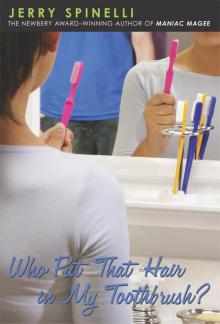 Who Put That Hair in My Toothbrush?
Who Put That Hair in My Toothbrush?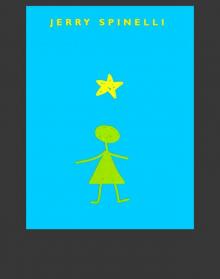 Stargirl
Stargirl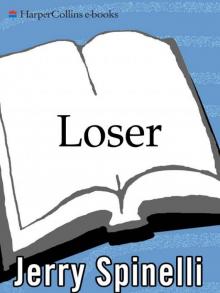 Loser
Loser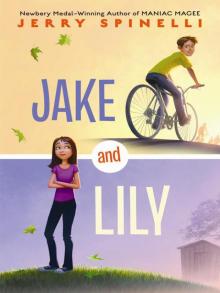 Jake and Lily
Jake and Lily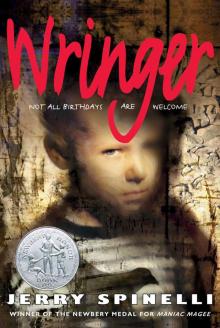 Wringer
Wringer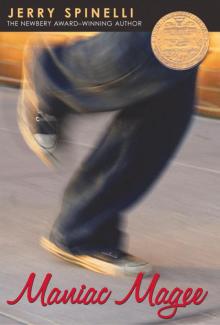 Maniac Magee
Maniac Magee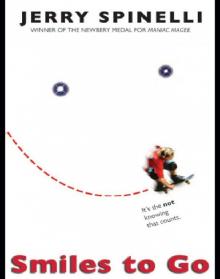 Smiles to Go
Smiles to Go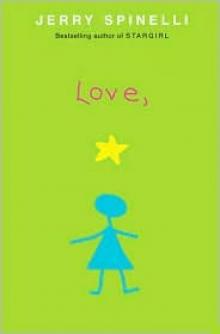 Love, Stargirl
Love, Stargirl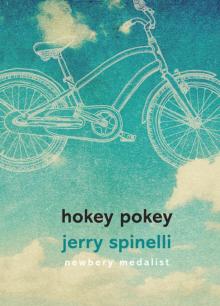 Hokey Pokey
Hokey Pokey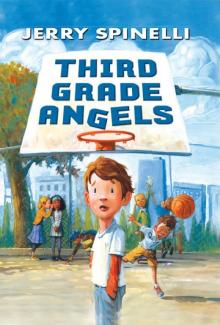 Third Grade Angels
Third Grade Angels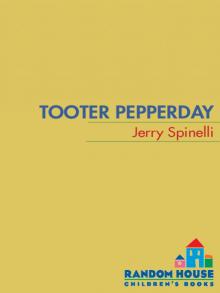 Tooter Pepperday: A Tooter Tale
Tooter Pepperday: A Tooter Tale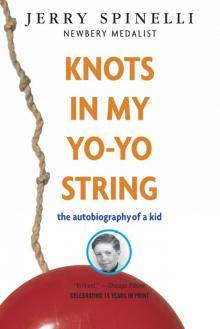 Knots in My Yo-Yo String Knots in My Yo-Yo String
Knots in My Yo-Yo String Knots in My Yo-Yo String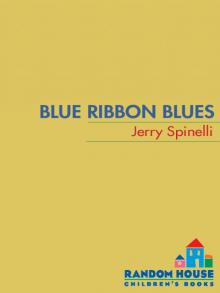 Blue Ribbon Blues: A Tooter Tale
Blue Ribbon Blues: A Tooter Tale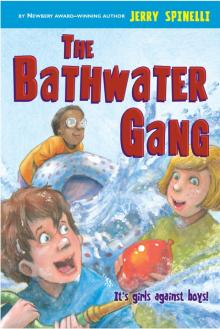 The Bathwater Gang
The Bathwater Gang Crash
Crash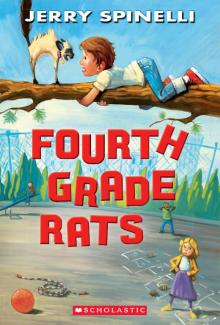 Fourth Grade Rats
Fourth Grade Rats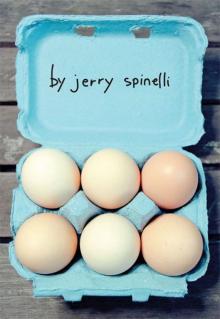 Eggs
Eggs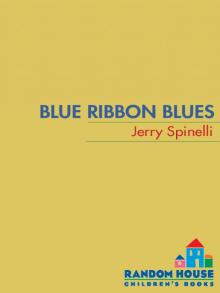 Blue Ribbon Blues
Blue Ribbon Blues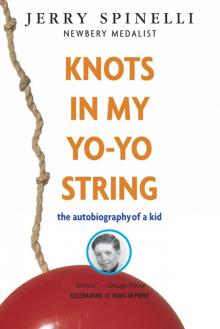 Knots in My Yo-Yo String
Knots in My Yo-Yo String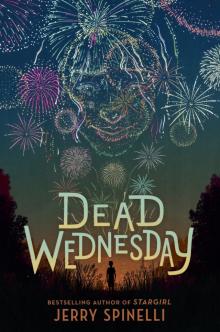 Dead Wednesday
Dead Wednesday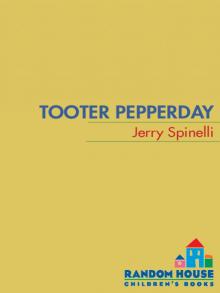 Tooter Pepperday
Tooter Pepperday